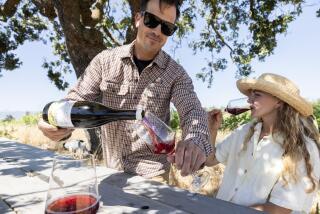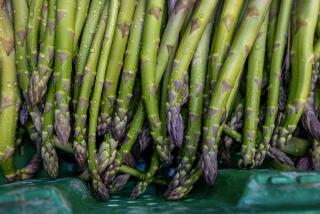Strapped for Cash : San Pasqual Vineyards Files Bankruptcy Papers
SAN DIEGO — Plagued by an incurable disease that has poisoned most of its plants, staggering from the domestic wine industry slowdown and strapped for cash, San Pasqual Vineyards, San Diego’s largest vineyard and winery, has filed for Chapter 11 bankruptcy reorganization.
San Pasqual listed assets of $768,936 and debts of $780,813, according to bankruptcy documents filed by the company earlier this week.
The company’s largest secured creditor is Escondido National Bank, which is owed more than $378,000, according to the bankruptcy documents.
The bank has another connection to San Pasqual: Bank director Charles W. Froehlich Jr., a local attorney and a former San Diego Superior Court judge, is a director, treasurer and founder of San Pasqual.
Another Escondido National Bank director, Escondido rancher Earle W. Frey Jr., is owed more than $4,700, according to the documents. He is also a director of San Pasqual Vineyards.
Froehlich is owed more than $31,000 by San Pasqual, bankruptcy records show.
Escondido National Bank President Harvey Mitchell defended the loans to San Pasqual. “We have excellent collateral and we have personal guarantees from (some of) the individuals,” he said.
Mitchell said the San Pasqual loans aren’t yet delinquent. “There’s no way this will be written off as a loan loss,” he said. “We were proud of (these loans) and we still are.”
Hit by Pierce’s Disease
San Pasqual, founded in 1973, was devastated the last two years by Pierce’s disease, an incurable disorder that attacks the roots and tops of vines. The disease is especially prevalent in temperate climates such as San Diego; the native plants actually transmit the disease via migrating insects, although the local foliage is unaffected by it.
“You can take measures to prevent it, but once it inhabits the vine there is no cure,” Froehlich said in an interview Wednesday.
San Pasqual abandoned all but 30 of its 100 acres because of the disease, losing about 80% of its plants, said Froehlich.
Escondido National Bank loaned the company money in the spring of 1984, apparently after Pierce’s disease began ravaging San Pasqual’s vineyards.
In addition to the disease, the company has suffered from the general slowdown in the domestic wine industry. “The whole wine industry isn’t increasing production like we had hoped,” said Froehlich.
Wineries can now “buy grapes cheaper than you grow them,” said Froehlich, who blamed the situation on the “excessive competition from cheap-money countries (that receive) government export assistance, such as France, Spain, Germany, Italy, Portugal, Australia and Chile.”
Nonetheless, the company projects gross revenue of about $700,000 for the fiscal year ending Oct. 31, said Froehlich.
The company now buys most of its grapes from Northern California vineyards, although some of its plants are still producing, said Froehlich.
The company, with more than 60 shareholders, has “substantial inventories” of bottled and bulk wine, Froehlich maintained, which “will be sold and creditors will be paid. That’s our plan.”
San Pasqual management will remain debtor in possession during the bankruptcy reorganization. “We’ll emerge from this,” said Froehlich. The problem is a lack of cash, not a lack of equity.”
The company’s president is local attorney Milton Fredman, who took over when Kerry Damsky left the post under “mutual agreement” in December.
Damsky, according to Froehlich, “bought too many grapes and we couldn’t sell them.”
Froehlich is also general partner of several avocado ventures, which “weren’t affected” by the San Pasqual bankruptcy, he said.
Frye is also a general partner in some of those avocado grove limited partnerships. One of them, Rios Canyon Ranch, recently liquidated at “substantial losses to the investors,” according to a source familiar with the project.
The grove was reportedly worth about $6.6 million two years ago, although it sold last year for only $3.1 million. That resulted in a reported loss to each of the 36 investors of about $25,000, the source said.
More to Read
Inside the business of entertainment
The Wide Shot brings you news, analysis and insights on everything from streaming wars to production — and what it all means for the future.
You may occasionally receive promotional content from the Los Angeles Times.










